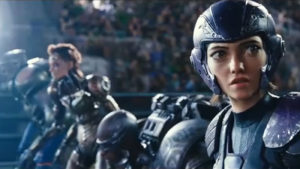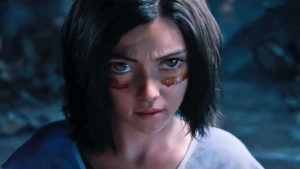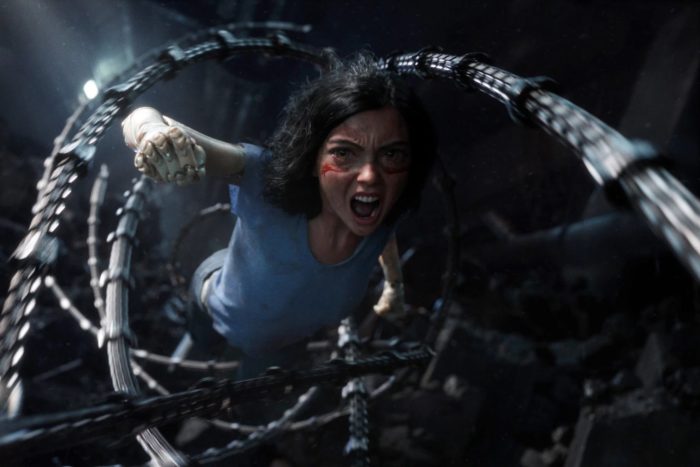 Alita: Battle Angel is a totally awesome mess. It’s got an unbelievably good lead in the heretofore-mostly-unknown Rosa Salazar, whose character should stand pretty much as deep in the Uncanny Valley as you can get, but somehow manages to be charming, likable, endearing, and not even a little bit creepy. It brings heavy capital-A Acting from Christoph Waltz, Mahershala Ali, and Jennifer Connelly. It’s got beautiful visuals and heart-pounding action that frankly rival most of the stuff coming out of Marvel these days. The visual language and technical filmmaking are top-notch. The CGI is perfectly believable in all but a few places. More than anything, though, it builds a completely and fully engrossing world out of nothing but anime remnants, Tron castoffs, the stuff that lives in the borderlands between Blade Runner and The Matrix, and more than a little bit of stuff they stole from Wall-E’s storage unit: to wit, a post-apocalyptic world that I really and truly want to see more from.
Alita: Battle Angel is a totally awesome mess. It’s got an unbelievably good lead in the heretofore-mostly-unknown Rosa Salazar, whose character should stand pretty much as deep in the Uncanny Valley as you can get, but somehow manages to be charming, likable, endearing, and not even a little bit creepy. It brings heavy capital-A Acting from Christoph Waltz, Mahershala Ali, and Jennifer Connelly. It’s got beautiful visuals and heart-pounding action that frankly rival most of the stuff coming out of Marvel these days. The visual language and technical filmmaking are top-notch. The CGI is perfectly believable in all but a few places. More than anything, though, it builds a completely and fully engrossing world out of nothing but anime remnants, Tron castoffs, the stuff that lives in the borderlands between Blade Runner and The Matrix, and more than a little bit of stuff they stole from Wall-E’s storage unit: to wit, a post-apocalyptic world that I really and truly want to see more from.
 And yet, all of that is wrapped up in a weak script that’s simultaneously too short and too long, doesn’t get started until it’s almost over, introduces and abandons character motivations with the focus of a two-year-old, sacrifices a substantial amount of narrative cohesion for a blatant sequel setup, provides a romantic interest who is—whether by poor acting or poor writing—about as emotionally deep as a puddle on a warm day (despite the fact that his emotional beats are presented with almost as much weight as Alita’s are), and stumbles across the finish line by accident, rolling the credits almost in the middle of a scene. It’s such a mess that I love it.
And yet, all of that is wrapped up in a weak script that’s simultaneously too short and too long, doesn’t get started until it’s almost over, introduces and abandons character motivations with the focus of a two-year-old, sacrifices a substantial amount of narrative cohesion for a blatant sequel setup, provides a romantic interest who is—whether by poor acting or poor writing—about as emotionally deep as a puddle on a warm day (despite the fact that his emotional beats are presented with almost as much weight as Alita’s are), and stumbles across the finish line by accident, rolling the credits almost in the middle of a scene. It’s such a mess that I love it.
There’s a funny sort of calculus to reviewing big-budget-but-somehow-still-underdog CGI-fests like Alita: Battle Angel; a tricky balancing act between expectations, intentions, and execution. With something like 2018’s Venom, for instance, all three were low: nobody thought it would be anything special, it didn’t try to be anything special, and—shockingly—it wasn’t anything special. It tried to be a C+, and it kind of succeeded, if you can call that success. But with Alita, while expectations were low, the intentions were sky-high: they clearly want this movie to become something, building a world with such verisimilitude and complexity, and characters with such heart and depth. In such a risk-averse Hollywood, I’m very impressed with the distance the filmmakers reached on this one. Execution could’ve been better, and I wonder if James Cameron would’ve done a better job in the director’s chair, but the film accomplished far more than I expected; it tried to be an A+ and managed to hit a solid B. I love the chance that Fox took on Alita, I think the filmmakers should be commended for reaching that far, and I can’t wait to see a sequel.
The bottom line is that this world is a beautiful, fully-realized place, the lead is charming and delightful, and the action scenes are spectacular. But while the story is weak, I think that we can still go deeper into the world of Iron City to see something important about who we expect our saviors to be.
Warning: spoilers below.
Alita’s arrival to Iron City is overtly Christ-like: she comes from the fantastic and idyllic world above, she arrives as a helpless person in a weak body that belies her incredible power and personal history, and she’s “born” into a lower class with no real status or power. But while the beginning of her story is like Jesus’, it quickly diverges.
Instead of preaching with power and knowing others better than they know themselves, she looks on the world as if she’s never seen it before (because she hasn’t), and her “preaching” causes everyone in the hunter-warrior bar to scoff at her pleas for assistance. Instead of healing and gently rebuking those who oppose her, she uses her Jason-Bourne-like suppressed memories to destroy them in combat; in most cases, literally.
But the salvation she offers is different, too; while she’s willing to offer her heart to those she loves, Alita’s goal isn’t to sacrifice herself. It’s more like what people expected from Jesus when He came to Earth: Alita puts together a small army to directly attack the powers of the world, both below and above. She metes out her vengeance on those who wrong her, and in the end, silently promises to take her crusade to the dictator who’s pulling all the strings in Zalem.
 She’s the savior that everyone expected Jesus to be. The “other Simon” among Jesus’ apostles was a Zealot, a member of a first-century terrorist organization who believed that the Messiah would lead Israel in a military revolt against Rome. James and John, two other disciples, assumed that Jesus’ worldly revolution was coming soon and asked for places of honor in His kingdom. After Jesus was raised from the dead, the assembled Christians present for His ascension assumed that He was going to kick Rome out and sit on the throne of Israel. Even the Romans were concerned that Jesus intended to foment a violent insurrection against them.
She’s the savior that everyone expected Jesus to be. The “other Simon” among Jesus’ apostles was a Zealot, a member of a first-century terrorist organization who believed that the Messiah would lead Israel in a military revolt against Rome. James and John, two other disciples, assumed that Jesus’ worldly revolution was coming soon and asked for places of honor in His kingdom. After Jesus was raised from the dead, the assembled Christians present for His ascension assumed that He was going to kick Rome out and sit on the throne of Israel. Even the Romans were concerned that Jesus intended to foment a violent insurrection against them.
But, instead, Jesus offered peace. Not only between humans, but between God and man. His revolution was not one of kicking the Romans out of Israel, but of battling sin out of our hearts. He did not at that time intend to sit on the restored throne of David, but to rule over the lives of His people by means of the Holy Spirit. And He had no intention of rebuilding the Temple by piling stones on one another in Jerusalem, but by gathering people to be transformed by His word and by saving the lives of his greatest enemies.
Alita’s salvation is inherently different from the salvation that Jesus offers. He offers peace; she offers death. He seeks reconciliation, and she seeks destruction. He carries the cross meant for us, and Alita carries a lethal sword. But these are not just arbitrary differences; her salvation is different because the threat is different.
For Alita, Ido, Hugo, and Chiren, their greatest threat is from above: Nova, the mysterious mind-controlling Zalem scientist bent on killing Alita and destroying those around her. Though he uses people in Iron City to accomplish his goals, it’s Nova himself who is the source of their danger. Their greatest threat comes from beyond, from above; and they need a champion.
And although we also need a champion, Jesus’ enemy is not outside us. It is us.
Christ came to save us from our sins, but sin isn’t something that happens to us, it’s something we do. It’s a nature and choice that we’ve made, a darkness inside of us that has to be removed surgically, like a malfunctioning cybernetic heart. And it will kill us in the process, but we will rise from death with new hearts.
 The differences are all the more profound when you see their motivations. Alita is motivated by love, to the point where she’s willing to give her heart to Hugo; but the expression of her motivation is naive and weak, when you think about the lives she could truly change with the incredible technology which makes up her body. Her love is also limited to one person, a man she fell in love with vertiginously quickly. Though she expresses love, it is weak and human.
The differences are all the more profound when you see their motivations. Alita is motivated by love, to the point where she’s willing to give her heart to Hugo; but the expression of her motivation is naive and weak, when you think about the lives she could truly change with the incredible technology which makes up her body. Her love is also limited to one person, a man she fell in love with vertiginously quickly. Though she expresses love, it is weak and human.
Jesus, on the other hand, expresses His love in the strongest way possible. His love is for the people He created and chose, and it’s a love infinite in size and duration. And he doesn’t blithely give His life, but sacrifices Himself with purpose and conviction, to save the greatest number of people and express His love most strongly:
No one takes [my life] from me, but I lay it down of my own accord. I have authority to lay it down, and I have authority to take it up again.
—Jesus, John 10:18, ESV
None of these differences make Alita a bad film. But Alita’s attempted sacrifice drives home the reality of our expected savior: we thought our savior would be like us. We hoped he would save us from the problems we saw, ignoring the real dangers we face. We wanted him to lead us into battle, strike down our enemies, and be a champion for our cause; but instead, we got a gentle Savior who saves our enemies and champions His own mission. Someday Christ will come in glory, to defeat all who stand against Him and to take His rightful place as King of creation; but until that day, following our King will take us to a place of humility where His spirit leads us to reconcile with those who wish us harm. Our savior is not like Alita, and that’s a good thing.



